

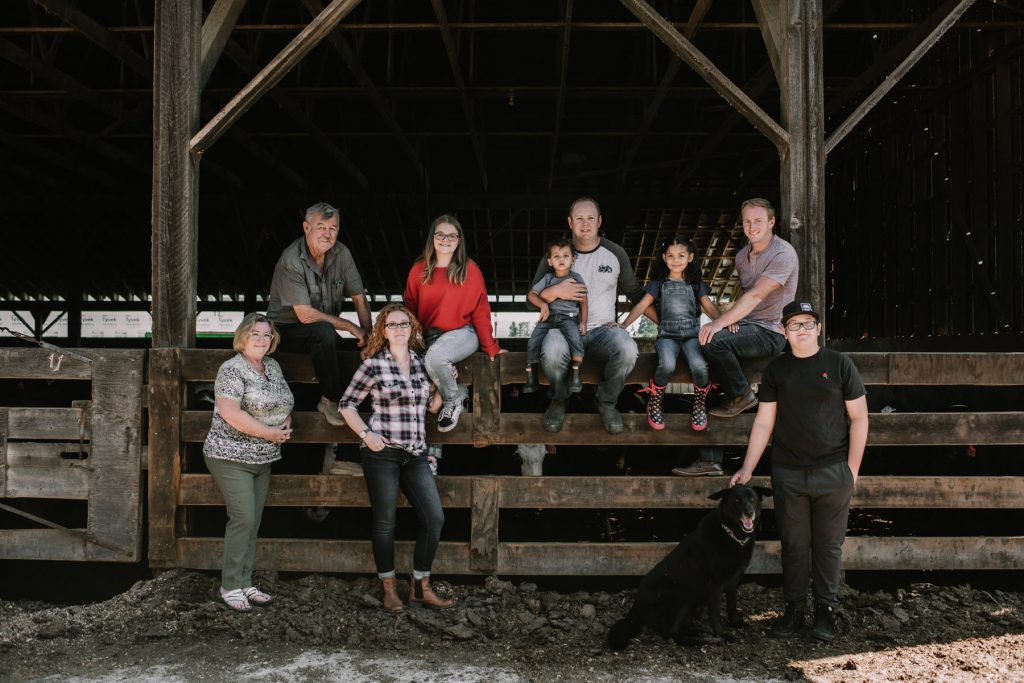
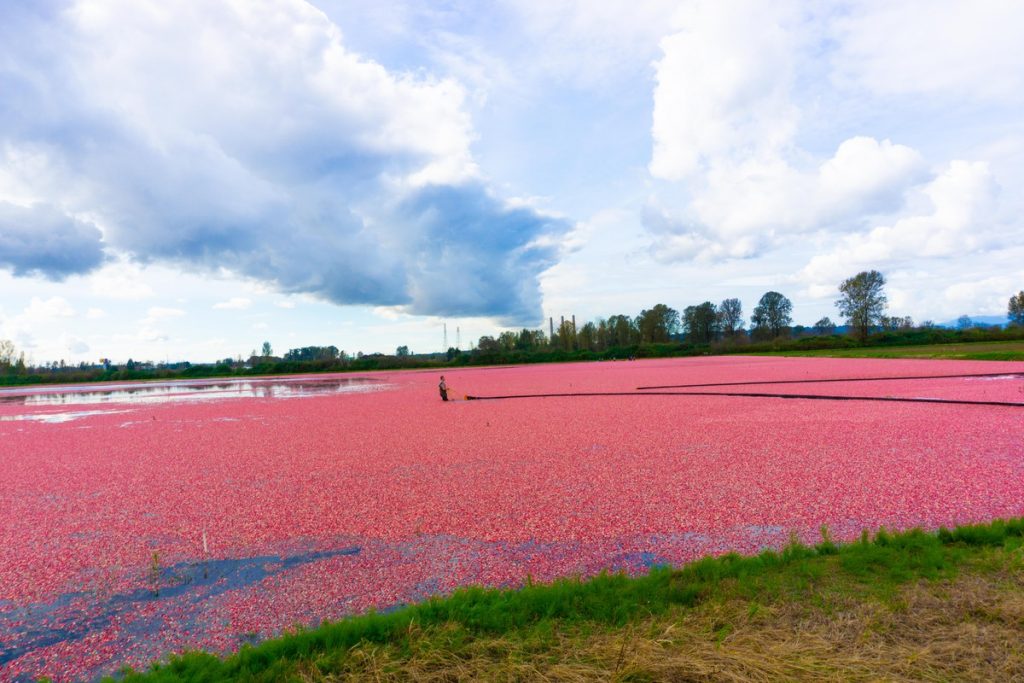
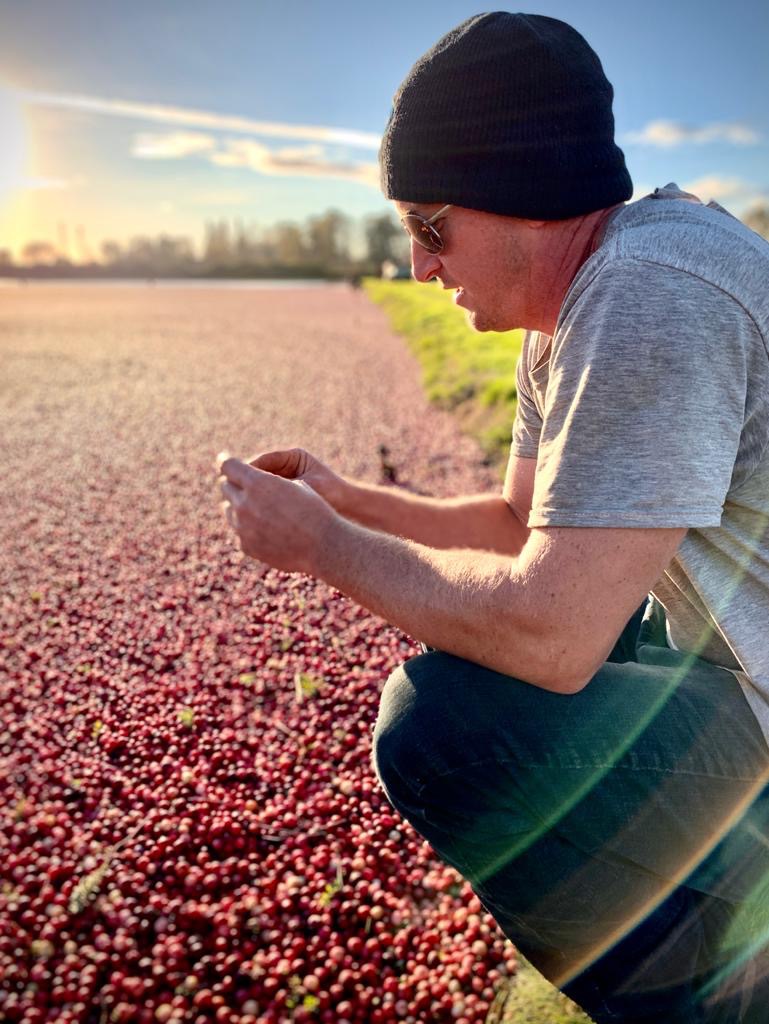
Farming in a Good Place
The Farm Your Numbers program is sure to up your understanding of your farm’s financial outlook. Just ask Travis Hopcott.
BY JESS CAMPBELL
Travis Hopcott will be the first to tell you that there’s a lot going on at Hopcott Farms. This multi-generational family farm and events space is just about as diverse as they come. “Our farm is located in Pitt Meadows, British Columbia, about 30 to 40 minutes from Vancouver. Our farm… (has) cranberries for Ocean Spray Cooperative, beef cattle, a 14,000 square foot retail specialty grocery and butcher store, a market garden, and an events venue that hosts weddings and other events. We’re also selling manure, hay and other things. I farm with my younger brother, my parents and my sister.”
Travis’ grandfather (“Poppa” as Travis calls him) purchased the land the family farm still resides on back in 1932 for $9000—a lot of money in those days. As the third generation, Travis has had the opportunity to work both on and off the farm, following the call to experience other work environments. But eventually, Travis’s experiences brought him back home, where he’s been farming with his family ever since.
Like most young farmers who embark on the Farm Your Numbers program, Travis had a strong desire to better understand the numbers behind his family’s well-known and successful farm business. “The program emphasized that our operation is in a good place. I’m that much more confident of the direction we are going.”
And which direction might that be? According to Travis, it could be anywhere, as long as the business is sustainable. “When it comes to sustainability, the business has to be environmentally, economically and socially stable. So, those three pillars are our focus going forward.”
Having been named one of two runners-up in the Farm Your Numbers contest, Travis is happy with both his efforts to learn as much as he could from the course and with where the family’s farm business is going. “I’m very satisfied I did my best and super happy for my fellow runner-up and winner of the contest. I’m excited to see how these very intelligent women will use their winnings towards their ventures.”
Looking at the farm’s numbers from his perspective, Travis knows he has the information he needs to move forward with confidence. But the message he has for other young farmers who may be thinking of registering for next year’s course isn’t all to do with finances. “The curriculum side will give you a comfortable foundation for your current and future endeavors; it’s very much worth it. Plus, it connects you with other fellow young farmers across the entire country.”
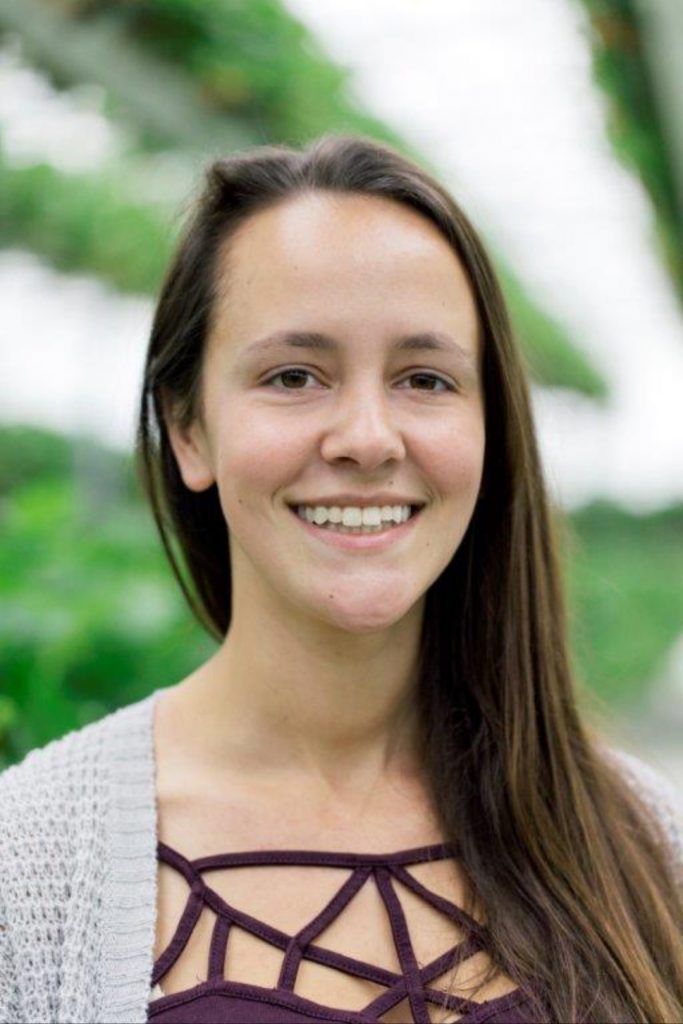
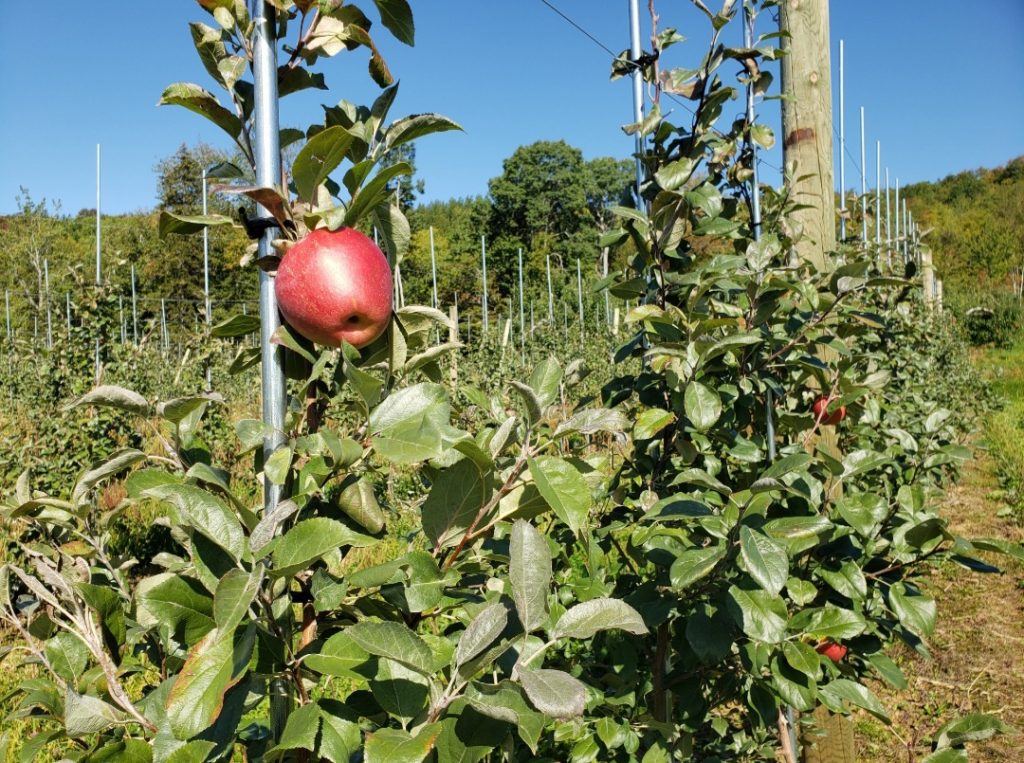
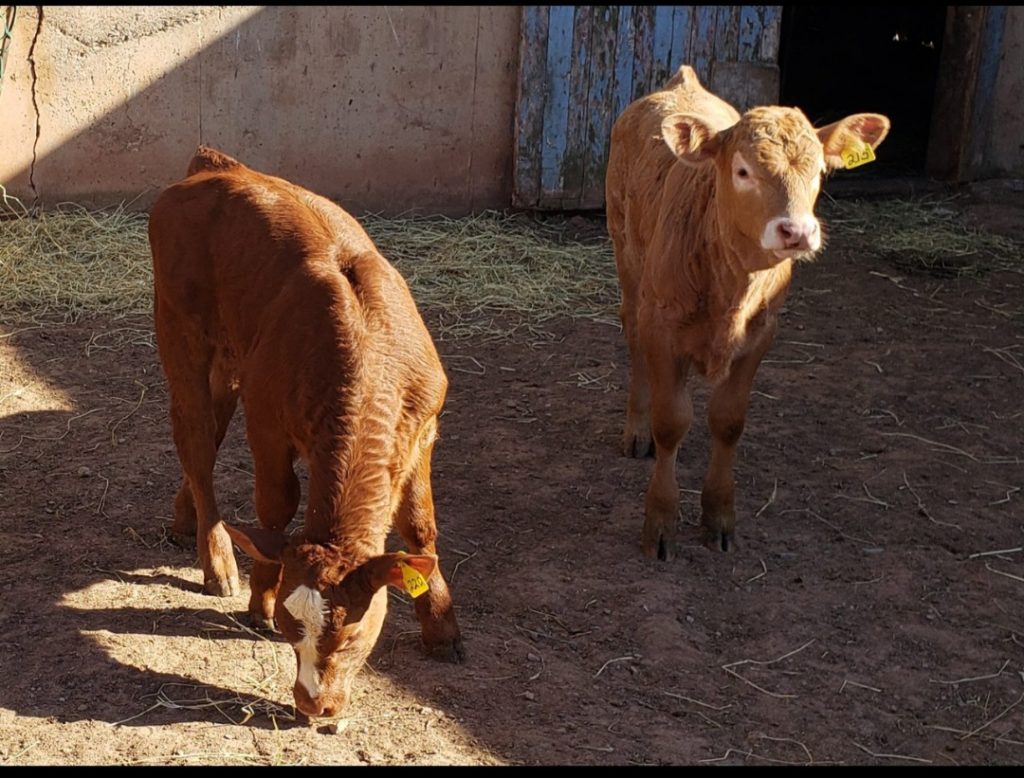
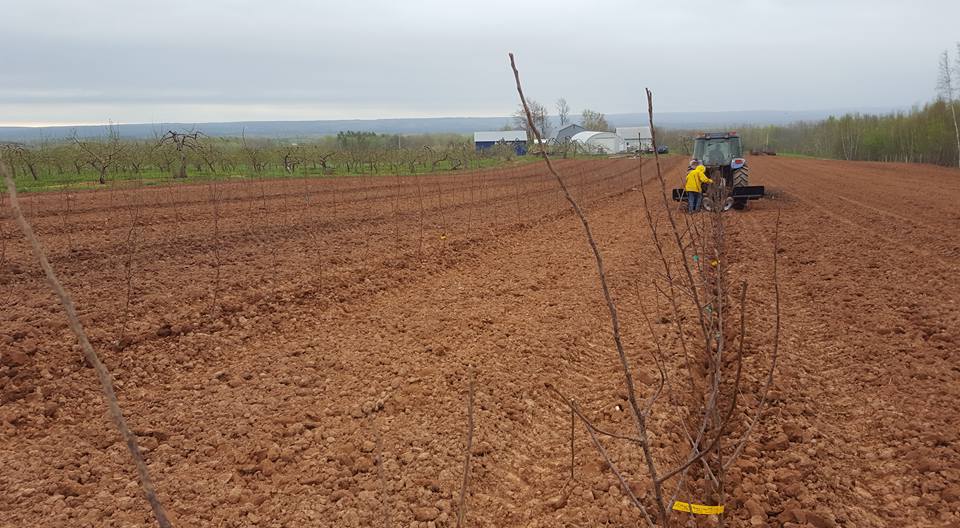
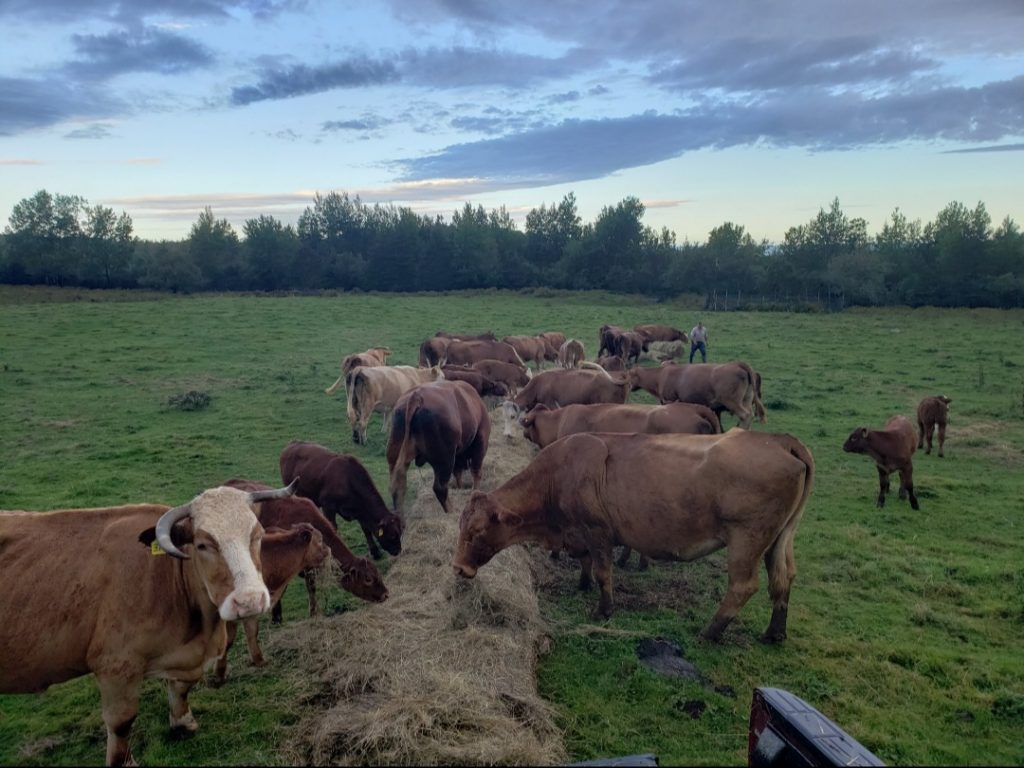
Knowing Where You’re Going
Taking the Farm Your Numbers course helped Jessica D’Entremont see her future.
BY JESS CAMPBELL
The Farm Your Numbers program is obviously about your farm’s numbers. While understanding the present-day numbers is crucial, so is being able to make accurate projections to figure out where your farm will be going in the future.
Jessica D’Entremont is a sixth generation apple and beef farmer in the Annapolis Valley of Nova Scotia. Although she works full time off the farm right now, working on-farm during evenings and weekends, she and her father, who owns the farm outright at the moment, are in the beginning stages of making big plans. “We’re working on a succession plan which is why I took the course,” says Jessica. “I wanted to get a better idea of what I’d be taking over when the time comes.”
Jessica says she and her dad have been working together on the business side of things for awhile now; as an only child, Jessica has long had an interest in taking over the farm someday when her dad is ready. In the meantime, she’s been delving deep into the farm’s numbers to ensure they continue to make smart financial decisions. “I hashed out what adding more acreage of orchard might look like, and it’s just a matter of whether I would jump into that all at once or add it on acre by acre. (The course) definitely gave me a way better understanding of where (the farm) sits, how it’s run, and why we share equipment between both sides of the farm. I definitely feel more secure in the process of taking over the farm now.”
Speaking of both sides, Jessica’s family farm has had apples for all six generations and has built up a successful beef herd over the years, too. “We’ve got 13 acres of apples in production, and about 30 cow-calf pairs. It’s always been an orchard; this is actually the fewest number of acres the orchard has ever had. My great-grandfather would have had enough acres of orchard to have about 30 employees during harvest time. Nova Scotia was shipping apples overseas; in the 1930s, it had the biggest apple production of any province in Canada, so it made sense to have more acres. And there was always beef for the family. The farm has gone from being a very mixed farm – hogs, chickens, whatever you needed to sustain your family – to now. My grandfather built up the beef side of the business and my father has kept that going, and that’s my plan as well.”
While Jessica is already making lots of plans alongside her dad, she’s not quite sure when she’ll come home to the farm full time. However, she’s in no rush, thanks to an already solid relationship with the patriarch of the family. “I have no clue when the switch will happen; whenever dad decides he wants to. We’re quite open about things already. I tell him what I think we could be or should be doing, and then he takes that and does what he will. For example, we’ve been working together to improve the pastures and efficiencies on farm. He’s always supportive of any interest I have in the farm.”
Jessica was named one of two runners-up in this year’s Farm Your Numbers competition, which was a complete shock to her. “I didn’t expect to get into the top 7 and I really didn’t expect to get into the top 3. I was happy that my plan made sense to someone else other than me! (laughs) Then to see that Carolyn (Wilson) won was awesome. That’s going to mean huge changes for her, which is great to see. I’m super excited to see how that works for her.”
For now, Jessica plans to keep on keepin’ on: working full time in the agriculture sector off the farm while working alongside her father, comfortable in the knowledge that their apple and beef farm will continue well into the future, thanks to her understanding of the farm’s numbers. “If you’re considering taking the course, go for it,” Jessica says of other young farmers who may be thinking about registering for next year’s course. “You get a great understanding of what’s happening on your farm, but you also get to understand what other people are doing and what issues they’re running into. It’s more than what I’ve gotten out of a business course at university. You’re actually dealing with your own farm and looking at it from your own perspective, which is nice. I’ve already recommended it to a lot of my friends. Go for it. It’s 100% worth it.”
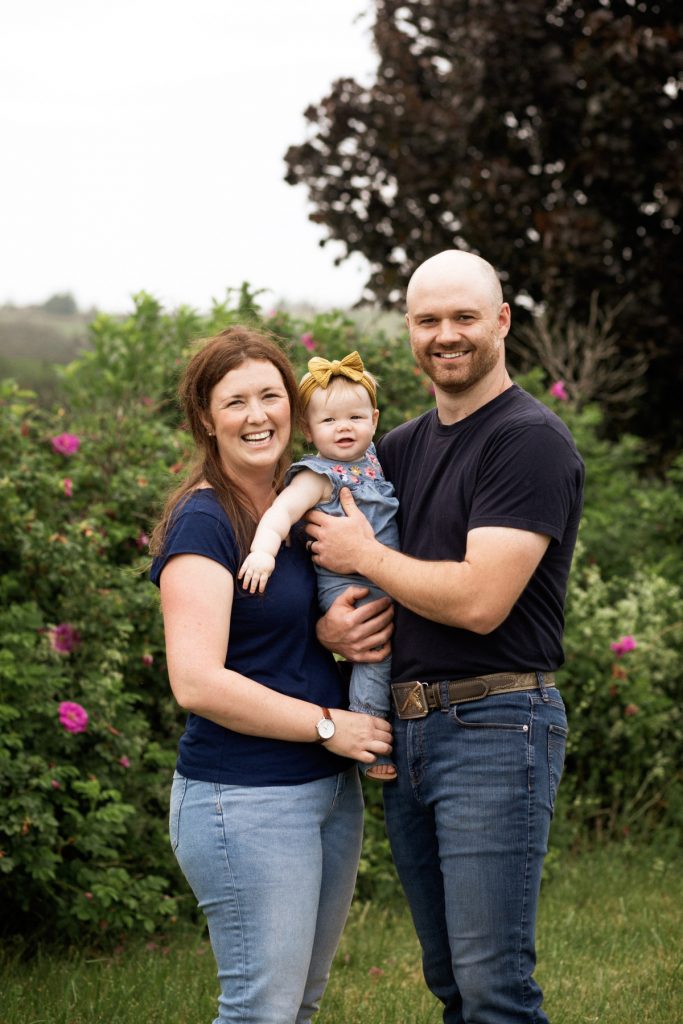
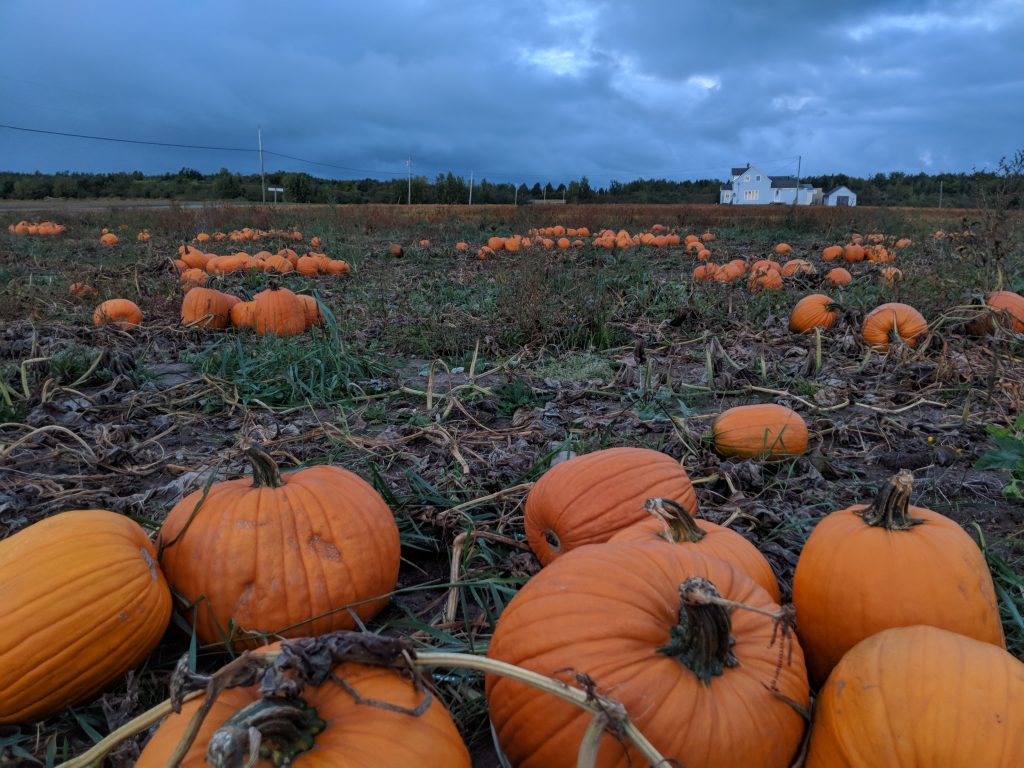
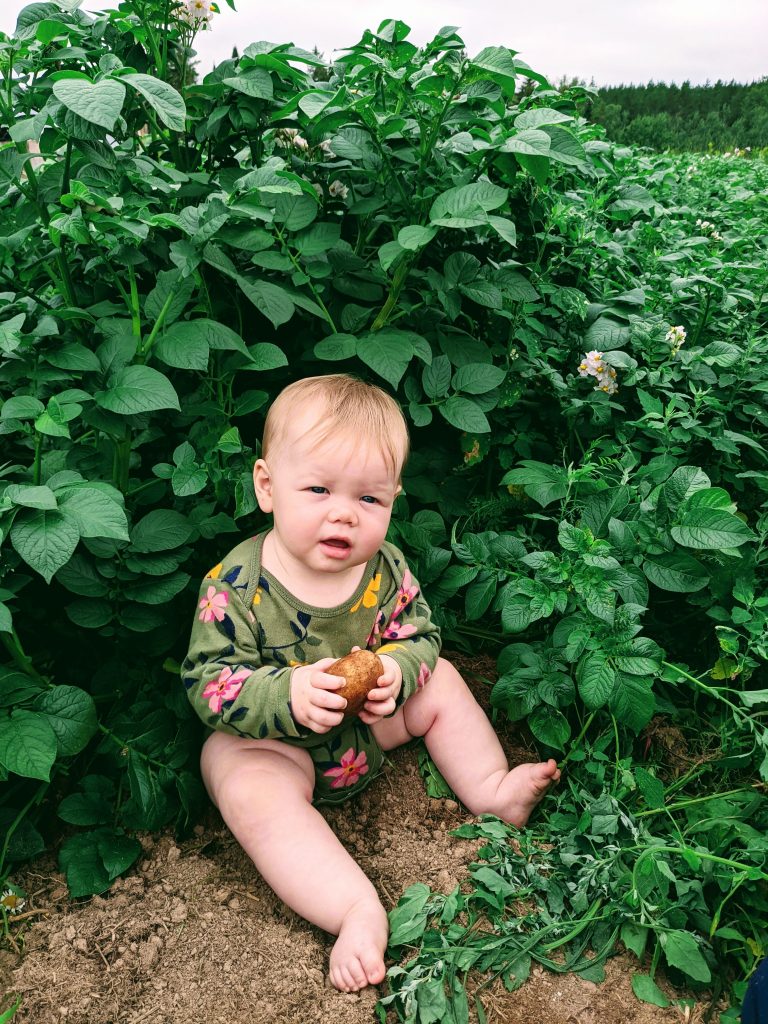
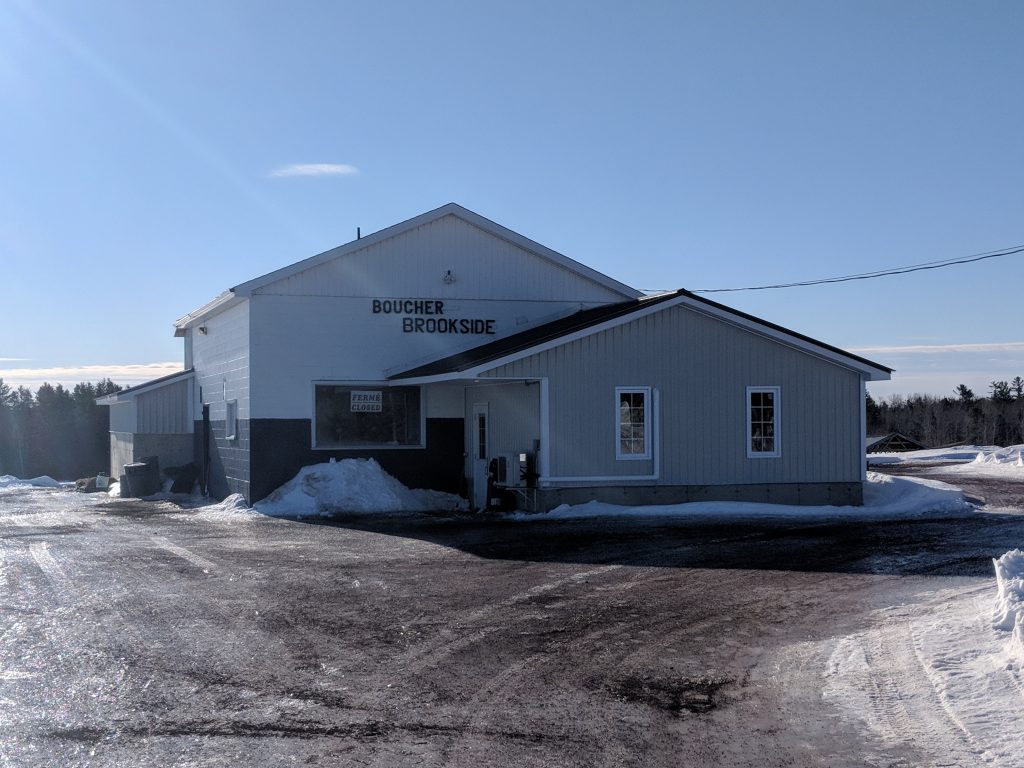
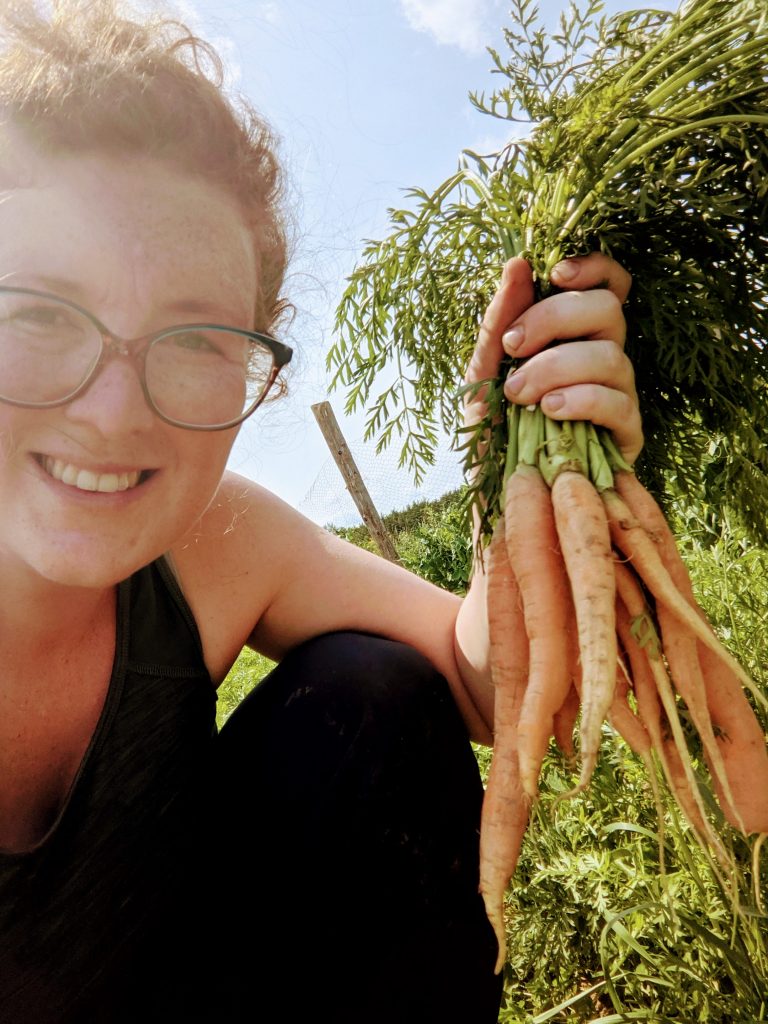
Confidence in Numbers
Carolyn Wilson, New Brunswick farmer and winner of this year’s Farm Your Numbers contest, knows that to understand where you’re going, you need to know where you are.
BY JESS CAMPBELL
Managing the farm books isn’t an easy task. Some people will actively shy away from it altogether, choosing instead to delegate the task to another person or hire someone off the farm to do all the bookkeeping. The thing is, there’s a certain level of confidence you can gain from diving into your farm numbers and learning how the financial side of your business really works.
The Farm Your Numbers program offered through the Canadian Young Farmers Forum (CYFF) definitely helped Carolyn Wilson build her confidence in her farm business numbers. Carolyn and her husband, Mark, own a small farm and abattoir in Southeastern New Brunswick. They work with both of their parents for livestock supply to the abattoir, but have recently expanded into vegetable production. Winning this year’s grand prize of $20,000 will go a long way to helping their expansion get off the ground. “Our Farm Your Numbers project involved expanding the vegetable production aspect of our business and we do need some investment in infrastructure and equipment,” Carolyn says. “This money would definitely help us.”
It’s not every day that young farmers have the chance to win money to put toward their farm. But that’s exactly what the Farm Your Numbers contest offers, and then some. The contest is a guided and self-study course designed specifically for young farmers to help them identify strengths and areas of improvement, with the goal of creating a plan to make their farm business more profitable and successful. For Carolyn, winning was surprising, to say the least. “Firstly, (we were) shocked! There were such great projects shared by other young farmers, I definitely didn’t expect it. After the shock wore off, it was definitely exciting. My husband was there for the announcement and he was just a fountain of ideas and plans.”
While winning the grand prize is fantastic, the Farm Your Numbers program provides young farmers much more in the way of learning opportunities, according to Carolyn. “The program offered some really nice benefits compared to some other training I’ve been involved in. The project aspect really helped apply the knowledge we learned in the information sessions. Having Heather and Larry from AME available to help was also great and provided some one-on-one support and clarity. Finally, sharing and listening to the projects of other young farmers was also great; to connect with others with similar challenges and to be inspired to try something new. The program gave us a chance to sit back and reflect who we are as a business and where we want to go. Creating a plan with the numbers to back it up definitely gives us the confidence to try something different and work a little harder.”
This year’s course and contest was conducted virtually throughout the months of December and January. While registration for next year’s contest won’t open for several months, it’s definitely a beneficial course to take if you’re looking to improve or expand your farm business, not to mention gain some confidence in knowing your farm’s numbers. Plus, a shot at $20,000 isn’t bad, either. “If you have a little extra time, DO IT!” says Carolyn. “Especially if you are making decisions in your business and have little background in financial or strategic planning, like us. It’s a great foundation and confidence builder!”
Farm Your Confidence
The Farm Your Numbers program helped Amy VanderHeide
realize a goal she’s had for 20 years.
By Jess Campbell
There is never a shortage of things to do as a young farmer. Oftentimes, there are so many things on the To Do list that you can easily put off certain tasks that don’t seem as important or as urgent. But that doesn’t mean those things shouldn’t eventually get done.
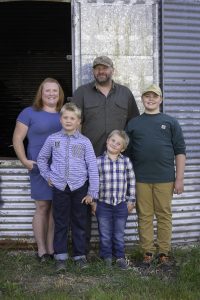 Amy VanderHeide is a broiler, beef and grain farmer from Coldbrook, Nova Scotia, and participated in the most recent cohort of the Farm Your Numbers program. While most participants come out of the program having a drastically more in depth knowledge of their farm business, Amy came out with that and something else.
Amy VanderHeide is a broiler, beef and grain farmer from Coldbrook, Nova Scotia, and participated in the most recent cohort of the Farm Your Numbers program. While most participants come out of the program having a drastically more in depth knowledge of their farm business, Amy came out with that and something else.
“A direct result of taking the Farm Your Numbers program is that I, as of September, started going back to community college to get my business diploma,” Amy says. Married at 19 and with her first baby at 21, Amy always knew she wanted marriage and a family. What she didn’t know was what was next. “I had applied to college out of high school but I didn’t know what I wanted to do. It has always been in the back of my mind to go back to school at some point. Last year, being stuck at home, I took some workplace education courses that are offered through the Nova Scotia Federation of Agriculture. I took financial management and leadership, then Farm Your Numbers on top of that. It just gave me the confidence that I can do this.”
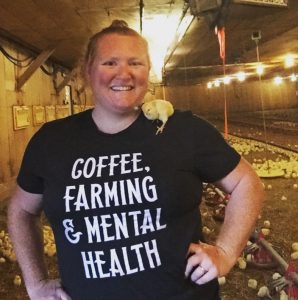 Amy and her husband own a small commercial cow calf herd, for which Amy does all of the bookkeeping; the broiler and grain operations are farmed together with Amy’s in-laws. While it’s almost impossible to compare the two farms in terms of numbers, Amy has gained a vast amount of confidence in being able to understand what’s going on for both operations. “When you’re using numbers or anything financial, you have to be able to relate it to something,” Amy says. “(The program) made me look at the numbers of our farm in a whole new light. It forms a relationship with those numbers and with the business. So many of us plug those numbers into a computer, the computer does the work and we don’t think twice about it. But really, it allows you to get to know those numbers and ratios, and why this amount is what it is and what that means for the future of your business.”
Amy and her husband own a small commercial cow calf herd, for which Amy does all of the bookkeeping; the broiler and grain operations are farmed together with Amy’s in-laws. While it’s almost impossible to compare the two farms in terms of numbers, Amy has gained a vast amount of confidence in being able to understand what’s going on for both operations. “When you’re using numbers or anything financial, you have to be able to relate it to something,” Amy says. “(The program) made me look at the numbers of our farm in a whole new light. It forms a relationship with those numbers and with the business. So many of us plug those numbers into a computer, the computer does the work and we don’t think twice about it. But really, it allows you to get to know those numbers and ratios, and why this amount is what it is and what that means for the future of your business.”
Amy says that her level of understanding of her farm numbers is what helped boost her confidence overall, enough to go back to college. “It’s scary when you’re not doing (the books). It’s scary to look at those numbers because, oftentimes, you don’t understand what you’re looking at. So, to go through the program and to network with other farmers just gave me the confidence that I needed to take that dive and go for it.”
Amy is a great example of what participating in the Farm Your Numbers program can do for someone. Yes, you’ll get a handle on your farm business numbers and feel more confident in that aspect. But you may also gain confidence in other areas of your life, too. Who would have thought a course about managing your farm business could potentially build your confidence level overall?
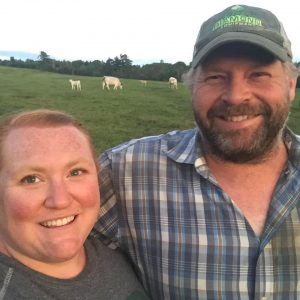 “It goes so much farther beyond knowing your numbers,” Amy says. “I’ve always wanted to go back to school, but I don’t know if I would have gone back if I hadn’t participated in the program this year. You actually develop a business plan. Especially for young farmers, when it seems there’s always a lot stacked against us to either get into farming or grow a farm or even just change into something new. Having that business plan and knowing what it means, you have all that information behind you. For young farmers who’re at the point where they’re looking ahead to their future and what can make that easier for them, Farm Your Numbers is definitely something they should do.”
“It goes so much farther beyond knowing your numbers,” Amy says. “I’ve always wanted to go back to school, but I don’t know if I would have gone back if I hadn’t participated in the program this year. You actually develop a business plan. Especially for young farmers, when it seems there’s always a lot stacked against us to either get into farming or grow a farm or even just change into something new. Having that business plan and knowing what it means, you have all that information behind you. For young farmers who’re at the point where they’re looking ahead to their future and what can make that easier for them, Farm Your Numbers is definitely something they should do.”
The Farm Your Numbers program may be one more thing to add to your To Do list, but it definitely will be worth doing sooner rather than later.
Registration is now open for the next cohort of the Farm Your Numbers program, scheduled virtually to begin in December 2021 and continue until January 2022. Head to cyff.ca/farm-your-numbers-registration-form for details and to register.
Succeeding with Farm Your Numbers
While understanding your farm numbers is top priority, Andrea DeRoo discovered the Farm Your Numbers program applies to much more than that.
By Jess Campbell
The Farm Your Numbers program is obviously about, well, numbers. But it can also help young farmers with various other aspects of the farm business, such as succession plans.
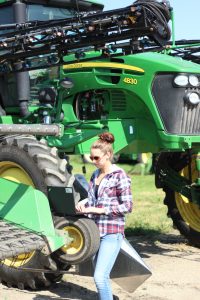 Andrea DeRoo, along with her parents and brother, is a grain and commercial cow calf farmer from Southeast Saskatchewan. Andrea decided to participate in the program in 2020, not only because she’d heard good things about it but also because she finally felt it was time for her to be more involved in the business side of the farm she would inherit from her parents.
Andrea DeRoo, along with her parents and brother, is a grain and commercial cow calf farmer from Southeast Saskatchewan. Andrea decided to participate in the program in 2020, not only because she’d heard good things about it but also because she finally felt it was time for her to be more involved in the business side of the farm she would inherit from her parents.
“As we got talking (with my parents) about my brother and I taking over the farm and some of the behind-the-scenes work that needs to be done, I was like, okay, it’s time. I need to start to understand these ratios, what they mean, why they’re important, and just make sure we keep the farm financially operational as we take it over, and then beyond that.”
Admittedly, Andrea had not worried too much about the farm’s numbers before, but with good reason. “My mom is a trained accountant, so my brother and I never had to worry about the numbers. Mom was dealing with it!”
As young farmers well know, if there’s an opportunity to learn more about your farm’s numbers from the previous generation, you take it. Participating in the Farm Your Numbers program helped Andrea do that, and more. “It really helped our team’s communication a lot. My dad and brother work mostly at the daily operation of the farm, then I am more focused on the field management side. We never really spoke to one another as a team (about what was going on in our respective areas). The program brought us together and allowed us to make some strategic decisions more confidently on our farm.”
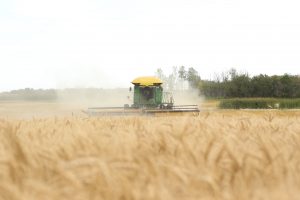 Another significant way the program helped Andrea and her farm was by Andrea winning the contest, a financial bonus which allowed them to purchase more land and expand their farm sooner rather than later.
Another significant way the program helped Andrea and her farm was by Andrea winning the contest, a financial bonus which allowed them to purchase more land and expand their farm sooner rather than later.
Perhaps one aspect of the program Andrea wasn’t expecting to be so impactful was the section on succession planning. “At first, my brother and I weren’t in the succession plan conversation. It was really being driven by my mom. Getting that perspective of succession planning from the program’s coordinators, learning about that parent/child dynamic, understanding where people are coming from, even human resources management and understanding that everyone has goals on the farm, and how we can all function as a team—the succession planning part helped me realize that it was time to get things down on paper and actually start the planning. It also helped us understand how to manage things so we’re not financially burdened by the numbers. My mom’s philosophy is that she and dad would like to die broke.” (laughs)
Now when Andrea looks at the farm she’s taking over, she’s able to understand not only the daily numbers but also what the future will look like for both she and her brother as they become primary owners of their operation. “For my brother and I, we learned how much flexibility we had to take on more debt. We found out that we were sitting really good, and that there might be an opportunity to expand on our land purchases in the area, and that now was a good time to do that. We have picked up a small number of acres because of that without putting us in a terrible place financially.”
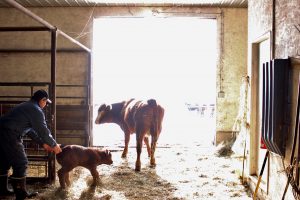 Andrea’s advice to any young farmer considering participating in Farm Your Numbers is pretty simple. “Do it! (laughs) I was big into 4H, and their motto is learn to do by doing. This course has such an educational part but then also has a practical part of actually putting what you’ve learned into practice on your farm that year. It’s a fantastic program.”
Andrea’s advice to any young farmer considering participating in Farm Your Numbers is pretty simple. “Do it! (laughs) I was big into 4H, and their motto is learn to do by doing. This course has such an educational part but then also has a practical part of actually putting what you’ve learned into practice on your farm that year. It’s a fantastic program.”
A Blooming Farm Business
How do you pivot a booming agri-tourism business so it’s more manageable? You farm your numbers, according to Alexis Szarek.
By Jess Campbell
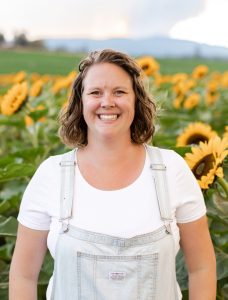 For almost five years, Alexis Szarek ran the ever-popular Abbotsford Tulip Festival just outside of Abbotsford, British Columbia. Each spring, she and her father, along with a multitude of help, would plant ten acres of tulip bulbs, turning that acreage into a rainbow of vivid colour come mid-year. Upwards of 80,000 people would travel to the Festival every season, which was great for the dollar side of the business—but not so great for the mental or physical side of it.
For almost five years, Alexis Szarek ran the ever-popular Abbotsford Tulip Festival just outside of Abbotsford, British Columbia. Each spring, she and her father, along with a multitude of help, would plant ten acres of tulip bulbs, turning that acreage into a rainbow of vivid colour come mid-year. Upwards of 80,000 people would travel to the Festival every season, which was great for the dollar side of the business—but not so great for the mental or physical side of it.
Marriage, children and a desire to run a significantly less stressful but still financially viable business helped Alexis and her family decide to move away from the Abbotsford Tulip Festival, both literally and figuratively.
“In Abbotsford, it was crazy,” says Alexis. “Financially sustainable but not mentally or physically sustainable. We have two young kids and our marriage to consider! We’ve taken our business and moved it up into a quieter area where we can run a smaller but more sustainable festival.”
Alexis, her family and the tulip farm have moved to a new location, nestled in the Okanagan Valley, about an hour north of Kelowna. While the Coronavirus and a huge flood had significantly changed their 2020 plans already, Alexis says the Farm Your Numbers program she participated in at the end of such a tumultuous year gave her confidence in making the move in the first place. “In Abbotsford, we were working with my father’s farm. Whereas here, in the Okanagan, we’re doing it on our own. We have our own equipment and had to buy our own bulbs. We’re starting small and growing from there. But there’s nothing like what we’re doing up here, and that’s where the Farm Your Numbers program really helped. You have your numbers and you look at them and you can see the whole picture of your farm: strengths, weaknesses, competition, government policies, the entire financial health of the farm.”
For Alexis, it was the opportunity to really dig deep into her farm business numbers that she enjoyed the most, not only to see the historical trends of the tulip business but also to be able to confidently forecast expectations for the new location. “They talk about cash flow and budgets, but they have this financial analysis piece where they give you metrics—your margin ratios, your cost ratios, your investment performance—and they give you ways to calculate that and measure what you’re doing compared to your industry’s standards. Tulips and agri-tourism don’t have a strong set of industry standards to measure against, but the program gives you ways to think about it and ranges to consider so you know what a healthy business looks like for your sector.”
Having a bit of business experience and learning as you go is one thing. But having a handle on your farm’s financials and understanding the numbers, calculations and financial potential of your business can open up a world of possibilities—or at least help you get a loan when you need it. “I can read a spreadsheet and financial statements,” says Alexis. “But what the program provides you is an entirely new level of understanding and confidence in your business. Everything was fantastic in the course. But those ratios, and understanding how to calculate them and what a reasonable range, a great range, etcetera, was, and knowing where we could improve or see what was better than I’d thought, that was amazing. These ratios and measurements are really helpful when you’re going to talk to a bank for a loan. You’re talking in a language that they understand. You don’t just feel like you know what you’re doing, you actually know what you’re doing.”
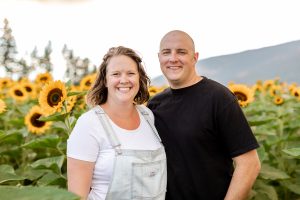 Knowing her farm numbers also helped Alexis to conduct a “strategic test run” on the new farm in the form of a Sunflower Festival, held in August 2021. The inaugural Okanagan Tulip Festival will happen in the spring of 2022, and the Farm Your Numbers program has helped Alexis to not only understand what worked in the past for her business but to also look forward and grow the new business in a financially, mentally and physically sustainable way. “You really can’t afford not to register for this program!” says Alexis. “The information you learn, the calculations you learn to do, the confidence you build in your ability to run your own farm business, the soft business skills you learn… it jump starts your business knowledge and definitely puts you much further ahead than you would be if you went about trying to learn it all on your own.”
Knowing her farm numbers also helped Alexis to conduct a “strategic test run” on the new farm in the form of a Sunflower Festival, held in August 2021. The inaugural Okanagan Tulip Festival will happen in the spring of 2022, and the Farm Your Numbers program has helped Alexis to not only understand what worked in the past for her business but to also look forward and grow the new business in a financially, mentally and physically sustainable way. “You really can’t afford not to register for this program!” says Alexis. “The information you learn, the calculations you learn to do, the confidence you build in your ability to run your own farm business, the soft business skills you learn… it jump starts your business knowledge and definitely puts you much further ahead than you would be if you went about trying to learn it all on your own.”
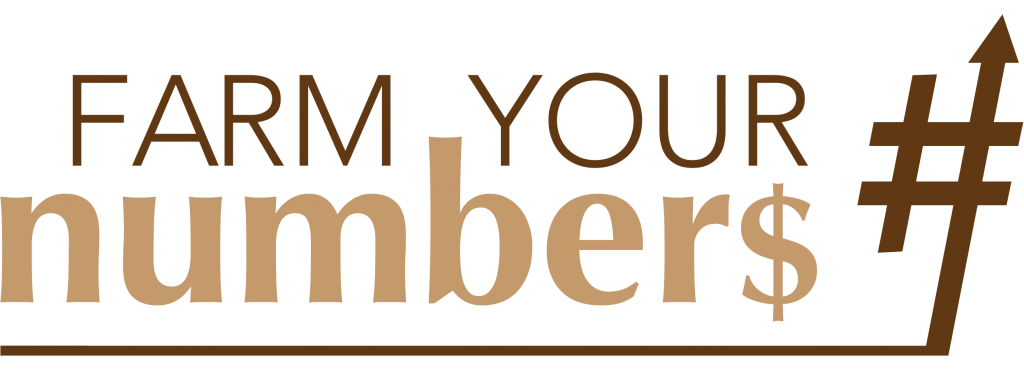
A guided and self-study course designed for young farmers to aid producers with identifying strengths and areas for improvement to help make operations more profitable and successful.
A course designed just for young farmers
strategic planning
basic financial management
human resource management
succession planning
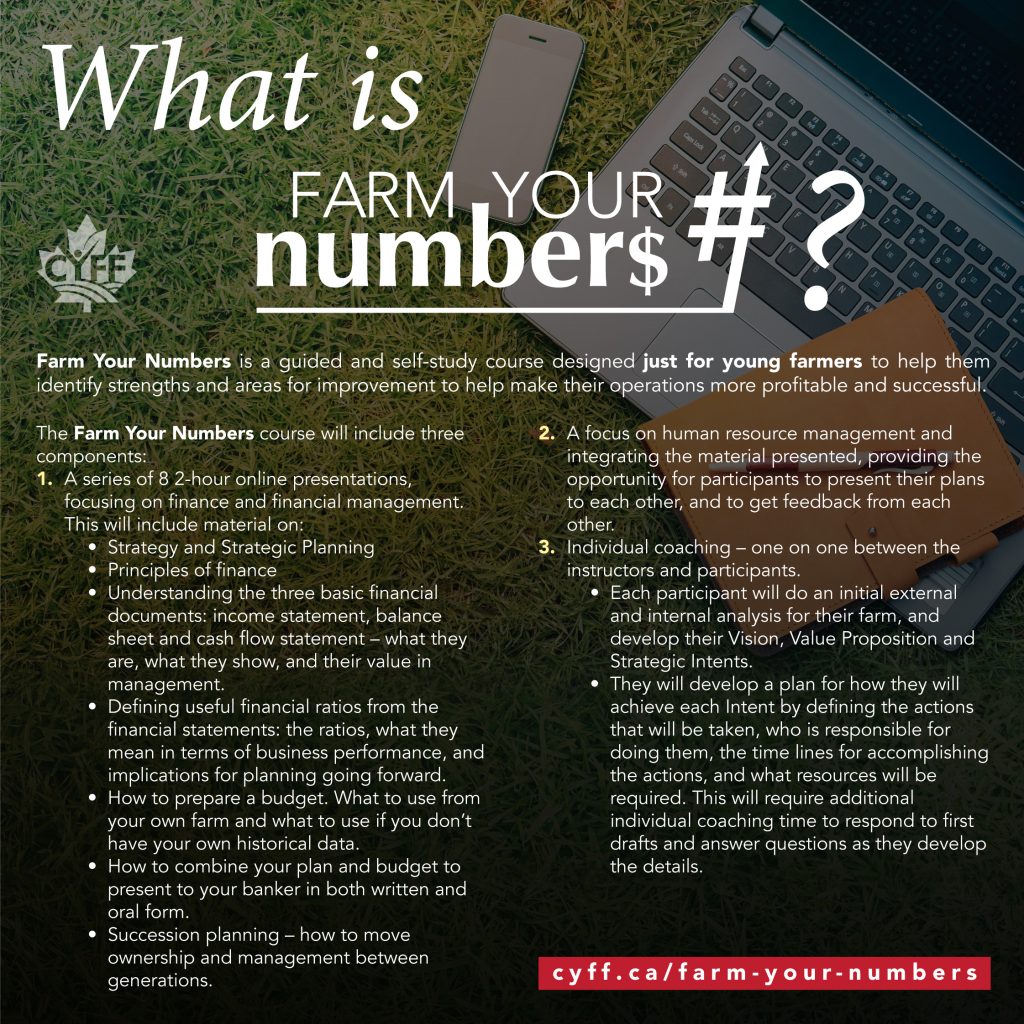
® Trademark of Royal Bank of Canada.
